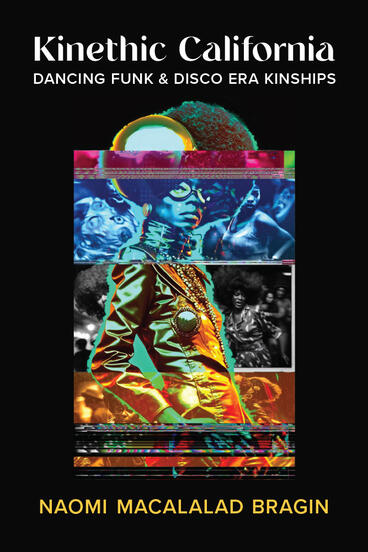Kinethic California
Dancing Funk and Disco Era Kinships
Explores the making of black social and vernacular dance in the 1970s, precursor to today’s global hip hop/streetdance culture
Description
Kinethic California: Dancing Funk and Disco Era Kinships documents the emergence of new forms of black social and vernacular dance invented by youth living in 1970s California, who helped build the foundations of contemporary hip hop/streetdance culture. Naomi Macalalad Bragin weaves interviews and ethnographies of first-generation (1960s-70s) dancers of strutting, boogaloo, robotting, popping, locking, waacking, and punking styles, as it advances a theory of dance as kinetic kinship formation through a focus on techniques and practices of the dancers themselves. She offers that the term given to these collective movement practices is kinethic to bring attention to motion at the core of black aesthetics that generate dances as forms of kinship beyond blood relation. Kinethics reorient dancers toward kinetic kinship in ways that give continuity to black dance lineages under persistent conditions of disappearance and loss. As dancers engage kinethics, they reinvent gestural vocabularies that describe worlds they imagine into knowing-being.
The stories in Kinethic California attend to the aesthetics of everyday movement, seen through the lens of young artists who, from childhood, listened to their family’s soul and funk records, observed the bent-leg strolls and rhythmic handshakes of people moving through their neighborhoods, and watched each other move at house parties, school gyms, and around-the-way social clubs. Their aesthetic sociality and geographic movement provided materials for collective study and creative play. Bragin attends to such multidirectional conversations between dancer, community, and tradition, by which California dance lineages emerge and take flight.
Naomi Macalalad Bragin is Associate Professor in the School of Interdisciplinary Arts and Sciences at the University of Washington Bothell.
Reviews
“Because Black social dancing has been theorized and documented in exceedingly limited forms, Kinethic California arrives with the fresh promise of catapulting the area into welcome relief as a valid and valuable area of inquiry. Urgent and provocative, it brings streetdance into conversation with Black feminist theory and Black Queer theory in important ways. The book’s structure and its pauses for poetic explorations are compelling, and confirm that Bragin dances well with words, translation, and those who have shared their stories with her.”
- Thomas F. DeFrantz
—Thomas F. DeFrantz, Northwestern University
“A vital intervention in the discourse on street dance, illuminating the kinship between West Coast street dances and the hip hop dances of the East Coast. With attention to how the dancers form community, training with one another and transmitting the dances from body to body, community to community, Bragin decenters the studio and shifts the focus to the places and people who make and perform the dances. Kinethic California is a loving tribute to the inventors of West Coast street dance, writing an intentionally underrepresented group into history.”
- Raquel Monroe
—Raquel Monroe, University of Texas at Austin

